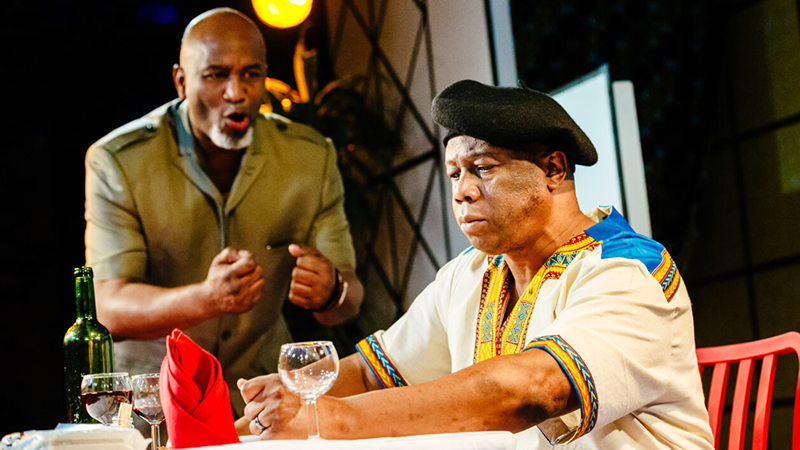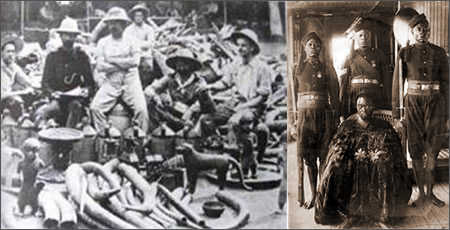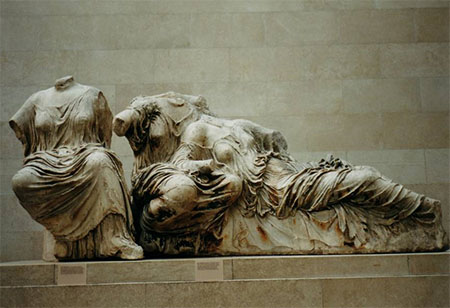One of the most persistent grass roots criticisms of African British art and literature has always been its lack of cultural authenticity and its overt penchant to pander to funders who seek only those African artists prepared to emphasise an urban ‘black’ British or a quaint primeval ‘Caribbean’ experience. Throughout 2007, the year Britain decided to celebrate its so called ‘abolition of the slave trade act’, publishing houses, theatres, museums and galleries across the UK focused on presenting a predictable diet of African history and culture locked in a myopic dialogue about slavery and the adulation of the parliamentarian William Wilberforce and British humanitarianism.
Statement of Regret is not a play about slavery. Yes, it does address the legacy of enslavement but it is far more sophisticated than the usual ‘slavery was bad, abolition is good’ fare being erroneously described as art.
By setting the play in a fictional ‘black’ policy think tank, the author has created the perfect environment to critically analyse some of the socio-political issues affecting the failure and success of African empowerment in the UK today.
Statement of Regret is not a play about racism. Although the issue is discussed the central thrust of the play is about the ramifications of disunity in the African community, the British media refers to it as inter-ethnic conflict, in reality it is about the challenges of Pan Africanism in an anti-African environment.
Cast: Angel Coulby (Issimama Banjoko), Oscar James (Soby), Trevor Laird (Val), Colin McFarlane (Michael Akimbola), Chu Omambala (Idrissa Adebayo), Javone Prince (Kwaku MacKenzie Jnr), Clifford Samuel (Adrian MacKenzie), Ellen Thomas (lola MacKenzie), Don Warrington (Kwaku MacKenzie) with music by Soweto Kinch.

With strong performances by the entire cast, the author plays out a precarious “what if?” situation that is the natural if not disastrous conclusion for the African British community if it continues to allow the government to once again divide it into ‘Continental’ and ‘Caribbean’ camps through colonial orientated miseducation.
When I saw the play the overwhelming majority of the audience in attendance were non African. Ironically this creates a different experience from when as I have been told in subsequent viewings the audience is more diverse. The nuances of the script are often lost as european audiences laugh at moments of pain, there are cheers and applause at sections intended for there to be an awkward silence. At first I questioned whether this was a failing of the writing, with hindsight I now see it as a characteristic of a culturally disconnected audience.
Criticism? The "conscious" brother was a cardboard cut-out worthy of more substantial character development, there is a marked absence of sisters in substantive and leadership roles, the relationship and family dynamics whilst essential a tad predictable, the opening act was perhaps too slowly paced, too jovial in places but perhaps this was the intent. Certainly the few Africans in the audience the night I was there also recognised what we were watching. Were these flaws merely a deliberate reflection of the healing still needed in our community?
The drama between absent father and son, the ideological gulf between those working towards reparation and the others aspiring to affluenza (the act of placing the acquisition of personal wealth and fame above all other social goals irrespective of the costs).
It’s no secret that the plays title "Statement of Regret" was inspired by Tony Blair, the former British Prime Minister and his refusal to apologise to Africa for Britain’s leading role in the Maafa. The African heart beating at the centre of the play is clearly a homage to the works of Dr Joy De Gruy Leary, author of the book "Post-Traumatic Slave Syndrome".
Is the play the authors own statement of regret, statement of intent or simply a political polemic delivered in a more accessible format? I don’t know, but what I do know is that by forcefully addressing key issues inherited from some of our elders (and forced "urban" cultural assimilation) but often left unsaid in our community, Kwame Kwei-Armah has once again proven why he remains an invaluable asset to the cultural and socio-political legacy of African people in Britain.

External Links
National Theatre - Statement of RegretITZ Caribbean - Statement of Regret
Statement of Regret is not a play about slavery. Yes, it does address the legacy of enslavement but it is far more sophisticated than the usual ‘slavery was bad, abolition is good’ fare being erroneously described as art.
By setting the play in a fictional ‘black’ policy think tank, the author has created the perfect environment to critically analyse some of the socio-political issues affecting the failure and success of African empowerment in the UK today.
Statement of Regret is not a play about racism. Although the issue is discussed the central thrust of the play is about the ramifications of disunity in the African community, the British media refers to it as inter-ethnic conflict, in reality it is about the challenges of Pan Africanism in an anti-African environment.
Cast: Angel Coulby (Issimama Banjoko), Oscar James (Soby), Trevor Laird (Val), Colin McFarlane (Michael Akimbola), Chu Omambala (Idrissa Adebayo), Javone Prince (Kwaku MacKenzie Jnr), Clifford Samuel (Adrian MacKenzie), Ellen Thomas (lola MacKenzie), Don Warrington (Kwaku MacKenzie) with music by Soweto Kinch.

Statement of Regret: About more than just slavery and racism
When I saw the play the overwhelming majority of the audience in attendance were non African. Ironically this creates a different experience from when as I have been told in subsequent viewings the audience is more diverse. The nuances of the script are often lost as european audiences laugh at moments of pain, there are cheers and applause at sections intended for there to be an awkward silence. At first I questioned whether this was a failing of the writing, with hindsight I now see it as a characteristic of a culturally disconnected audience.
Criticism? The "conscious" brother was a cardboard cut-out worthy of more substantial character development, there is a marked absence of sisters in substantive and leadership roles, the relationship and family dynamics whilst essential a tad predictable, the opening act was perhaps too slowly paced, too jovial in places but perhaps this was the intent. Certainly the few Africans in the audience the night I was there also recognised what we were watching. Were these flaws merely a deliberate reflection of the healing still needed in our community?
The drama between absent father and son, the ideological gulf between those working towards reparation and the others aspiring to affluenza (the act of placing the acquisition of personal wealth and fame above all other social goals irrespective of the costs).
It’s no secret that the plays title "Statement of Regret" was inspired by Tony Blair, the former British Prime Minister and his refusal to apologise to Africa for Britain’s leading role in the Maafa. The African heart beating at the centre of the play is clearly a homage to the works of Dr Joy De Gruy Leary, author of the book "Post-Traumatic Slave Syndrome".
Is the play the authors own statement of regret, statement of intent or simply a political polemic delivered in a more accessible format? I don’t know, but what I do know is that by forcefully addressing key issues inherited from some of our elders (and forced "urban" cultural assimilation) but often left unsaid in our community, Kwame Kwei-Armah has once again proven why he remains an invaluable asset to the cultural and socio-political legacy of African people in Britain.

Writer: Kwame Kwei-Armah
External Links
National Theatre - Statement of RegretITZ Caribbean - Statement of Regret
Ligali is not responsible for the content of third party sites





Get involved and help change our world